Purpose of the Resource Library
As part of the National Return to Work Strategy 2020-2030, Safe Work Australia has established this resource library to promote:
- tailored, client-centric and coordinated approaches to return to work
- culture and leadership that drives positive and supportive workplace relationships and behaviours
- best practice approaches in providing suitable duties and other workplace adjustments to ensure workers’ timely, safe and durable return to work, and
- return to work programs, policies and plans that follow the Strategy’s guiding principles.
Click on the tabs below to find the key resources in the library:
Safe Work Australia has published the following research reports:
- Research into Australian workers’ understanding of workers’ compensation systems and their communication preferences This report explores workers’ perception and knowledge of workers’ compensation systems and provides information on their communication preferences.
- Psychological response to injury: Research to support workers’ psychological responses to injury and successful return to work This report investigates how to meaningfully support workers return to work while minimising the adverse impact of any psychological response to injury.
- Stigma towards injured or ill workers: Research on the causes and impact of workplace stigma in the workplace, and approaches to creating positive workplace cultures that support return to work This report provides an evidence base and recommendations for supporting workers returning to work through building positive workplace cultures and minimising the adverse effects of stigma.
- Return to work in psychological injury claims This report analyses the data from the 2013 and 2014 National Return to Work Survey to explore the factors that influence a worker’s return to work outcomes. This report also includes a comparative literature review on return to work after a psychological injury.
- Return to work: A comparison of psychological and physical injury claim This report examines the similarities and differences between psychological and physical claims through analysing the data collected from the 2013 and 2014 National Return to Work Survey.
- Early intervention in the workers’ compensation process This report examines the evidence of different approaches to early intervention in workers’ compensation in Australia and what works to reduce recovery times and improve return to work outcomes for injured workers.
- Research examining pathways to secondary psychological injury This report examines the key drivers that contribute to an injured worker developing a secondary psychological injury. Secondary psychological injury refers to new or worsening mental health symptoms during a workers’ compensation claim.
Compensation Policy and Return to Work Effectiveness (COMPARE) project
Safe Work Australia supported Monash University’s COMPARE project which undertook research to develop an evidence base to support effective return to work policy and practices in Australia. The project has published research findings in peer-reviewed journals covering the impacts of legislative reform, payment step-downs, psychological distress amongst claimants, experiences of the health care system, and regional differences in time off work and disability burden.
Taking Action: A best practice framework for the management of psychological claims in the Australian workers’ compensation sector
This framework provides practical and evidence-based guidance to assist workers’ compensation insurers and claims managers to better support workers experiencing psychological illness or who are at risk of developing one.
The Health Benefits of Good Work
The Health Benefits of Good WorkTM (HBGW) is an initiative from the Australasian Faculty of Occupational and Environmental Medicine (AFOEM) of The Royal Australasian College of Physicians (RACP). This initiative is based on compelling Australasian and international evidence that good work is beneficial to people’s health and wellbeing and that long term work absence, work disability and unemployment generally have a negative impact on health and wellbeing.
Reducing workers’ compensation stigma
Safe Work Australia has produced a suite of resources aimed at injured workers, supervisors and employers to reduce the stigma associated with workers’ compensation.
National principles for communicating with workers
Safe Work Australia has created a set of national communication principles which aim to ensure effective communication with workers who seek information about workers’ compensation. Included is a checklist, a useful tool to help you apply the principles when developing communications for workers about workers’ compensation.
Managing the relationship with an injured or ill worker during return to work: A guide for supervisors in small and medium businesses
Safe Work Australia has partnered with the Behavioural Economics Team of the Australian Government (BETA) to produce a guide for supervisors in small and medium businesses to manage the relationship with an injured or ill worker during the return to work process.
The guide assists supervisors in supporting and staying in touch with workers who have suffered a workplace injury or illness. It helps them make the necessary changes to the workplace or work duties to help workers return to work sooner.
Developing a return to work plan: A guide and template
Developing a return to work plan in collaboration with an injured or ill worker is one of the best ways to support their recovery. Research shows workers have poorer health outcomes if they are away from work for a long time. A plan helps them return to good work, or to stay at work, while they recover.
The guide and template is for anyone developing a return to work plan. It provides practical advice and a step-by-step template for developing a successful plan in collaboration with an injured or ill worker.
A core function of Safe Work Australia is to develop and maintain an evidence base to inform workers’ compensation policy and practice.
The following reports support the National Return to Work Strategy:
The National Return to Work Survey
The survey is undertaken on a biannual basis and compares the return to work experiences and outcomes of injured workers against a number of variables, including returning to work, workplace rehabilitation and employer support. The latest ones are:
 2021 National Return to Work Survey Summary report
2021 National Return to Work Survey Summary report 2021 National Return to Work Survey Headline Measures report
2021 National Return to Work Survey Headline Measures report 2021 National Return to Work Survey Methodological report
2021 National Return to Work Survey Methodological report
COVID-19 workers’ compensation claims
This report provides a snapshot of COVID-19 related workers’ compensation claims from 1 January to 31 December 2020 and uses preliminary data from Commonwealth, state and territory workers’ compensation authorities and details claims by type, industry, occupation and jurisdiction.
Australian workers’ compensation statistics
This annual report provides detailed workers’ compensation statistics, including trends over time and statistics on time lost from work and compensation paid. Data is presented by key variables such as industry, occupation, age group and sex. The reports also include information on the circumstances surrounding work-related injuries and diseases.
 Australian workers' compensation statistics 2020-21
Australian workers' compensation statistics 2020-21 Australian workers' compensation statistics 2019-20
Australian workers' compensation statistics 2019-20
The Comparative performance monitoring reports analyse trends across Australia and New Zealand in work health and safety (WHS) and workers’ compensation schemes’ performance.
The reports consider serious claim rates and work-related fatalities, premium rates by industry, funding arrangements and disputation to compare workers’ compensation schemes’ performance.
Jurisdictional Resources
The State Insurance Regulatory Authority (SIRA) has a variety of resources and programs for stakeholders that support recovery and return to work (RTW):
For workers
- Have you been injured at work tool
- Benefits of working while you recover flyer
- Wellbeing and recovery videos
- Workers Compensation Assist – outbound calls to workers
For employers
- Return to work coordination – online eLearning modules
- Small business assist tool
- Videos that highlight the importance of workplace culture on RTW
- Mentally health workplaces toolkit
- RTW insider - Monthly email communication for employers providing evidence, advice, tools and resources to improve return to work systems, practices and outcomes
- SIRA RTW inspectorate
For insurers
- Claims Management guide for insurers including Standards of Practice related to early intervention and RTW and management of psychological injury claims.
SIRA funded programs
- Recover at work assist for small business
- Connect2work
- Equipment & workplace modification
- Training
- JobCover placement program
- JobCover6
- Transition to work
More detailed information on these programs and resources can be found on the SIRA website.
Other actions:
Recovery through work measurement framework and results
SIRA’s Recovery through work measurement framework includes both lead and lag metrics established from evidence based modifiable factors that measure a person’s return to work following an injury.
WorkWell Toolkit
WorkWell is a free online tool developed by WorkSafe and the Department of Health to support business leaders to build mentally healthy workplaces. Workwell provides step-by-step advice tailored to business size and industry type, as well as industry specific policy templates, resources, videos, case studies and more.
For further information see WorkWell Toolkit - WorkWell | WorkSafe Victoria
Mobile Case Management
Mobile Case Management (MCM) involves face-to-face support that can involve a combination of the injured worker, employer, the worker’s GP or other treating health practitioner, to discuss injury management, treatment and return to work options. MCM has been part of the WorkSafe model since 2016. There remains significant opportunity to expand use of MCM for injured workers with a primary mental injury claim.
For further information see https://www.worksafe.vic.gov.au/mobile-case-management
Recovery and Return to Work Program
WorkSafe Victoria has information and guidance to support workers and employers in the return to work and recovery journey. These can be accessed via the following links:
- Return to work | WorkSafe Victoria
- Provider information | WorkSafe Victoria
- https://www.worksafe.vic.gov.au/supporting-injured-workers
Further information can be found in the National Return to Work Strategy 2020-2030 - 3 year Scorecard
Information Videos (Animated)
A number of information videos have been developed and the following are available on the website. The video for Aboriginal workers has been translated into Yolngu Matha, Warlpiri, Kriol and EC Arrernte.
For further information see Workers' Compensation | NT WorkSafe.
Return to Work Plans
NT WorkSafe has an information page on what is return to work. Included in this is a video guide for employers, a return to work plan template and flowchart for employers.
The template and flowchart steps employers and workers through the plan which is delivered in line with a workers Certificate of Capacity. It is designed to make clear what the worker can and cannot do when they return to work, and when this will be reviewed.
For further information see Return to work plans (RTWP) | NT WorkSafe
Independent information, advice and support services for Queensland workers and employers
Workers’ Psychological Support Service
The workers’ psychological support service is a free, independent and non-technical service that connects psychologically injured workers’ to existing community and social support services to help minimise the impact of their injury.
The service is designed to be brief and connect workers to the support services they need. It provides links to community services such as emergency accommodation and housing support, family and domestic violence services, grief and loss support, financial counselling and social inclusion programs. It is available to injured workers with primary or secondary psychological injuries who have experienced the Queensland workers’ compensation claims process and is accessible via face-to-face consultation as well as video and tele-conferencing.
For further information see https://wpss.org.au/
Workers’ Compensation Information and Advisory Service (for workers)
The Workers’ Compensation Information and Advisory Service for workers is delivered through the Queensland Council of Unions (QCU) and provides technical workers’ compensation information to workers including but not limited to; applications for compensation, review and appeals and the medical assessment tribunal functions.
The independent information service is designed to directly support workers upon their enquiry. In addition, the service provides information sessions to Queensland union delegates regarding the Queensland workers’ compensation claims process, including employer and worker responsibilities regarding rehabilitation and return to work and the role of the information service.
For further information see Workers' Compensation Information and Advisory Service (qldunions.com)
Workers’ Compensation Advisory service (for employers)
The Workers’ Compensation Advisory Service for employers is delivered through the Chamber of Commerce and Industry Queensland (CCIQ) and provides technical support to Queensland employers through a toll-free helpline. The CCIQ also deliver educational material through regular topical webinars and face to face events throughout Queensland designed for employers, with a strong focus on Rehabilitation and Return to Work compliance, best practice, and systems and processes reviews.
For further information see https://businesschamberqld.com.au/services/workerscompensation/
Injury Prevention and Management (IPaM) Program
The program aims to review workplace safety systems and return to work systems against standards contained in legislation and guidelines and to assist the workplace in meeting compliance and best practice standards in these areas.
For further information see Injury Prevention and Management program | WorkSafe.qld.gov.au
Employer Rehabilitation and Return to Work Coordinator Education
The Workers’ Compensation Regulatory Services (WCRS) distributes a bi-monthly Rehabilitation and Return to Work e-Bulletin and maintains the Return to Work Queensland Facebook page, to provide rehabilitation and return to work news, development opportunities and practical tips on how to support injured workers.
WCRS delivers rehabilitation and return to work-focused presentations at its annual North Queensland and Brisbane Work Well Conferences, and as part of the Work Well 365 online events series.
Rehabilitation and return to work guidance for insurers
WCRS has released three guidance documents to support insurers to meet their legal obligations relating to rehabilitation and return to work, and to work towards achieving evidence-based better practice.
- Understanding rehabilitation and return to work terms, roles and responsibilities
This document outlines the rehabilitation and return to work terms, roles and responsibilities of all scheme stakeholders. - Accredited rehabilitation and return to work (ARRTW) program guideline – for insurers
This document outlines the minimum requirements that an insurer must meet to have its RRTW program accredited by the Workers’ Compensation Regulator, and clarifies the purpose of an insurer’s ARRTW program, how it can support an injured worker, and when an injured worker needs to be referred. - Rehabilitation and return to work plans guideline – for insurers
This document supports insurers to understand and fulfil their obligations relating to RRTW plans, including the minimum requirements that must be met.
Further information can be found in the National Return to Work Strategy 2020-2030 - 3 year Scorecard
Mentally Healthy Workplace Consultant
Through a Mentally Healthy Workplace Consultant, ReturnToWorkSA (RTWSA) provides employers with support and tools to develop, implement and monitor and review a mentally healthy workplace. This service is a free service and extends to employers in regional areas.
For further information see Mentally healthy workplaces (rtwsa.com)
ReSkilling Program
ReSkilling is a program aimed at providing services to workers who move to a ‘new employer’ goal or have more than 3 months off following their injury.
The service is designed to provide participants, often during their recovery, with skill maintenance in a safe and supervised environment, or the opportunity to develop new skills to improve employability.
For further information see ReSkilling (rtwsa.com)
Other actions:
RTWSA and its Claims Agents are also exploring opportunities to further enhance industry capability through skills competency building, undertaking early discovery work towards National Professional Standards and working with industry experts in biopsychosocial risk management to ensure evidenced-based principles are well embedded within our claims management model.
Further information can be found in the National Return to Work Strategy 2020-2030 - 3 year Scorecard
WorkCover WA continues to invest in upskilling key stakeholder groups to assist them to meet their scheme obligations and build their capacity for improving return to work outcomes.
Online training programs include:
- Foundations of workers compensation: Workplace Rehabilitation Providers
- Foundations of workers compensation: Claims Managers
- Understanding the workers compensation scheme in WA: Insurance Brokers
These programs offer tailored information and practical tools to assist learners to gain the skills required to optimise their performance and client service delivery
Educational videos
WorkCover WA’s online educational videos provide information about workers’ compensation claims, injury management and return to work processes.
Since the education videos were launched in 2017, a total of 12 videos (including one translated into Chinese-Mandarin and Bahasa Malaysia) have now been published on the WorkCover WA website.
For further information see Educational videos - WorkCover WA
Further information can be found in the National Return to Work Strategy 2020-2030 - 3 year Scorecard
Royal Australian College of General Practitioners - Accredited Post Traumatic Stress Disorder (PTSD) Training Program
The WorkCover Tasmania Board has launched PTSD training for general practitioners and others. The training was developed by Phoenix Australia, Australia’s leading experts in post-traumatic mental health and is accredited by RACGP and available through the learning portal on the RACGP Tasmania website.
The program includes guidance in relation to the requirements of the Tasmanian workers compensation scheme.
Workplace Rehabilitation Provider Accreditation Framework
The WorkCover Tasmania Board has developed a fit-for-purpose and contemporary accreditation process for workplace rehabilitation providers operating within the Tasmanian workers compensation scheme. The framework came into effect on 1 July 2023.
Further information can be found at WorkSafe Tasmania
Improving Injury Outcomes Project
The objective of the Improving Injury Outcomes Project is to analyse the workers compensation system within the Tasmanian State Service to identify factors (culture, system and process) to improve the performance claims management for employees and employers.
Further information can be found in the National Return to Work Strategy 2020-2030 - 3 year Scorecard
Healthier work program
The ACT Government provides a free program that supports employers to create healthy and safe workplaces. The program provides a community of businesses, resources and supports committed to promoting and achieving good mental and physical health in our workplaces. More information about the program can be found here: https://www.healthierwork.act.gov.au/healthier-work-2/.
Injured workers support service
The injured worker support service provides an independent information, assistance and support to injured workers in navigating workers’ compensation issues and claims process in the ACT. For more information about the services see: https://injuredworkerscbr.org.au/.
Awareness about managing psychosocial hazards at work – supporting injured workers
WorkSafe ACT has developed and implemented a Strategy for Managing Work-Related Psychosocial Hazards 2021-2023 which aims to build the maturity of organisations in identifying psychosocial hazards and managing psychosocial risks. The Strategy includes targeted engagement with stakeholders to build awareness and knowledge of existing workers’ compensation duties and obligations in managing work related psychosocial hazards.
Further information can be found in the National Return to Work Strategy 2020-2030 - 3 year Scorecard
Good work design
Comcare has released a suite of resources and micro learning modules to promote best practice, support employers to proactively address psychosocial hazards, and support work participation by encouraging practical application of good work design practices.
The brief videos and more comprehensive better practice guides were developed in consultation with the Australian Council of Trade Unions and the Australian Public Service Commission.
The Good Work Design resources and Good Work Design micro learns are available on the Comcare website www.comcare.gov.au.
Comcare’s Good Work Design Supporting return to work resources include a short video providing practical advice for managers. Comcare also has recovery and return to work videos for employees and employers at Recovery and return to work resources | Comcare.
GP resource to support good mental health
Comcare has collaborated with WorkSafe Victoria to adapt a video by Consultant Psychiatrist Dr Dielle Felman. The ‘Assessing capacity for patients with a psychological condition’ video provides information and recommendations for GPs on how to assess capacity for patients with a psychological condition.
Rehabilitation and Return to Work Guidance
Comcare has released a rehabilitation case manager handbook to support better practice rehabilitation management in the scheme. The handbook is a comprehensive ‘how to’ tool for rehabilitation case managers that is available online and complements the training that is also available.
Practical tools to support supervisors and improve return to work outcomes of injured or ill workers
In 2020, the Behavioural Economics Team of the Australian Government (BETA) published research on returning to work after illness or injury which included an accompanying suite of practical resources to guide supervisors in their conversations with injured or ill workers during their return to work journey.
In collaboration with the Mental Health Professionals’ Network, Comcare has developed webinars which provide practical information to health practitioners to help them engage with other stakeholders to facilitate work participation for injured workers, including Assessing functional capacity for work for psychological injuries, Collaborating with the workplace to enable good work for your patient and Supporting clients/patients with PTSD to participate in good work.
Supporting information
- Measurement Framework - National Return to Work Strategy 2020-2030
- Measuring return to work outcomes
- Methodology for the Measurement Framework - National Return to Work Strategy 20…
- Animation - National Return to Work Strategy Overview
- Animation - Supporting workers
- Animation - Building positive workplace culture and leadership
- Animation - Supporting other stakeholders
- Animation - Building and translating evidence

 Reducing workers' compensation stigma
Reducing workers' compensation stigma